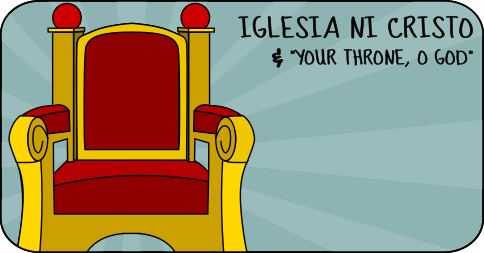Does the Father address the Son as God in Hebrews 1:8?

In almost every translation of the Bible, the Father addresses the Son as God in Hebrews 1:8.
Hebrews 1:8 (ESV) - But of the Son he says,
"Your throne, O God, is forever and ever,
the scepter of uprightness is the scepter of your kingdom.
However, some organizations such as the "Iglesia Ni Cristo" have doubted this understanding of the verse and proposed alternative translations[1]. They say that instead of "Your throne, O God", it should say, "God is your throne". Is such an alternative translations accurate?
The INC appeals to a faulty authority.
The INC claims that The Complete Bible: An American Translation contains the correct translation of the verse. Is this a reasonable authority to cite?
Dr. Goodspeed, the author of this translation, did his work by himself under no scrutiny from fellow scholars. All the major translations were created by a multitude of scholars working together to keep the translation honest, and have come to the conclusion that this verse does address Jesus as God.
The INC assumes this verse cannot call the Son God.
The primary reason the INC cites for this verse not addressing the Son as God is that it contradicts their assumption of the kind of God scripture teaches. In other words, instead of permitting God to teach them about himself, they are dictating what is true about God, and what he must say about himself. They refuse to believe that God, the creator of the universe, is more complex than their understanding allows.
It is highly unlikely such Greek would be used if "God" were the subject.
In Greek, the verse says:
Pros de ton huion ho thronos sou ho theos
Because both "thronos" (throne) and "theos" (God) are articular - that is, because they both have the article "ho" - the subject of the sentence would naturally be the first one. The translation to which the INC appeals calls "God" the subject, even though "God" is the second noun in the phrase. Based on Greek grammar alone, the INC's proposed translation falls short.
Additionally, it is unlikely such Greek would be used if "God" were the predicate. The INC has not suggested this, but it is conceivable that they may change their mind and do so. It is, however, highly likely such Greek would be used if "God" were vocative. In other words, this is exactly what we would expect to see if the Son is being addressed as God.
For more, information on the Greek grammer of Hebrews 1:8, see this article
This verse says "Your throne, O God" in the Hebrew Old Testament.
Additionally, the INC fails to realize that this is a quote from the Old Testament, written in Hebrew, which says,
Psalm 45:6 (ESV) - Your throne, O God, is forever and ever.
The scepter of your kingdom is a scepter of uprightness;
Even in Hebrew, this verse addresses one as God. Obviously, in translating this verse into Greek, we would expect the meaning to be retained. The INC's claim is that this evidence of the correct translation in the Hebrew Old Testament does not have weight. However, they have not provided any legitimate reason to discard this evidence.
This verse says "Your throne, O God" in the Greek translation of the Old Testament.
The Septuagint, the Greek translation of the Old Testament, is quoted by the author of Hebrews more than any other New Testament author. In this translation the king in Psalm 45 is addressed as "dunate" (mighty one), which is unambiguously vocative. This means that the author of Hebrews, in his general agreement with the Septuagint, would have understood this verse as addressing the king, not as the king being the subject of the sentence.
Conclusion
The INC has no valid reason to accept Dr. Goodspeed's faulty translation over the standard, highly-accepted, well-supported translation which states that Jesus is God. The only reason they reject the proper translation of this verse is that they do not want Jesus to be God. Their true intention is to exert their authority over scripture instead of letting scripture exert authority over them.
[1] See this INC article.
